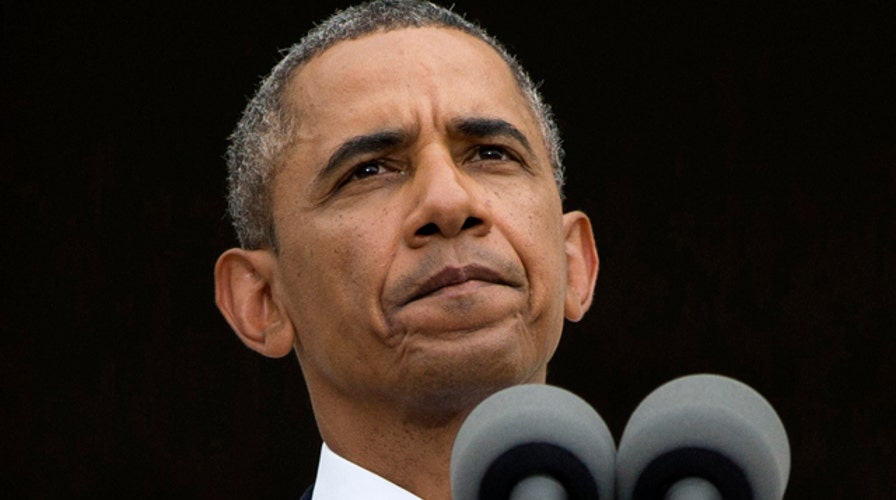Military action in Syria a 'no-win' scenario for Obama?
Fox News contributor Jonah Goldberg weighs in
The impending U.S. military action in Syria is likely to extend beyond the capital city of Damascus, and would be focused on the delivery systems for the Syrian regime's chemical weapons arsenal, sources told Fox News.
These systems, and the U.S. military strikes against them, would accordingly include both command-and-control facilities located in the capital but also Syria's short-range missile launchers and artillery positions, which are said to be located in mountainous areas outside of the city.
Bashar al-Assad's presidential palace and Syrian government ministry buildings are not expected to be among the sites the U.S. will strike, the sources said. In part, this reflects the fact that many of the key officials and systems at such facilities have already been evacuated, the sources said.
Senior U.S. officials would not discuss the precise scope or likely targets of the campaign, but did confirm that the targeting of command-and-control facilities and missile and artillery batteries was among the options the Pentagon presented to President Obama. "That fits in with what the president has discussed," a well-placed source said. While officers at U.S. Central Command, which has responsibility for the Syrian theater, await a final decision from the commander-in-chief, they are said to expect the campaign to be "narrowly tailored."
The Obama administration, however, has yet to settle on a specific course of action, and is said to be waiting for its allies to firm up support for the operation before proceeding. A British draft authorizing approval for such intervention was rejected by the Russians at the U.N. Security Council. Britain and France, which are allied with Washington, are said to be awaiting a report from U.N. weapons investigators following their expected departure from Syria on Saturday.
The emerging details about the kind of operations the U.S. is planning to conduct was also hinted at in a statement issued this morning by the British government setting forth the legal justification for allied military action in Syria. The statement explicitly noted that the goals of the action include "deterring and disrupting the further use of chemical weapons" by the Assad regime. The disruption of the regime's ability to launch further chemical attacks would necessarily entail attacks on the delivery systems that Mideast sources cited.
Asked on Wednesday if the campaign will seek not only to deter the Assad regime from further chemical attacks by the infliction of "random and wanton pain on the regime" but also by degrading the "physical ability" of the regime to launch such attacks, State Department spokesperson Marie Harf replied: "Those are two goals, I think, that we have."
Obama administration officials have differed, however, in the degree to which they see the upcoming campaign as one that will materially benefit the military standing of the various rebel groups opposing Assad in the Syrians' two-year civil war. Some U.S. officials told Fox News that "of course" the strikes at the regime will be aimed at producing the collateral benefit of inching Assad closer towards being toppled from power, while others cautioned that policymakers are wary of creating the conditions on the ground that would allow the "wrong" rebel groups -- those most closely allied with Al Qaeda -- to sweep into power and gain control of the banned stockpiles that are presently at issue.
The Israeli Defense Forces, meanwhile, are said to have concluded that the likelihood of meaningful retaliatory action against the Jewish state by either the Assad regime or Iranian "proxy" groups, like the terrorist network of Hezbollah, is low. This is because the Syrians are believed to be reluctant to draw Israel into their civil war, and because the Iranians, already mindful of longstanding Israeli threats to strike at the Islamic regime's nuclear apparatus, are likewise believed to be wary of precipitating a confrontation with Jerusalem.
"We are preparing for [a Syrian or Iranian counter-measure]," an Israeli source told Fox News, "but we are not really expecting it. ... The Iranians are not going to waste their [use of] force for an American attack on Syria."
Sources said the Israelis are among those pressing the Obama administration to act sooner rather than later, citing fears that the "legitimacy" of the operation would be "eroded" by too much delay.
The Saudis, for their part, are said to be running interference for the allies with the Russian government, and to be rallying Arab support by speaking up about the offensiveness of the use of chemical weapons, and by arguing for the attack of Aug. 21 to be met with appropriate punishment. A spokesman for the Saudi government did not immediately return requests for comment.





